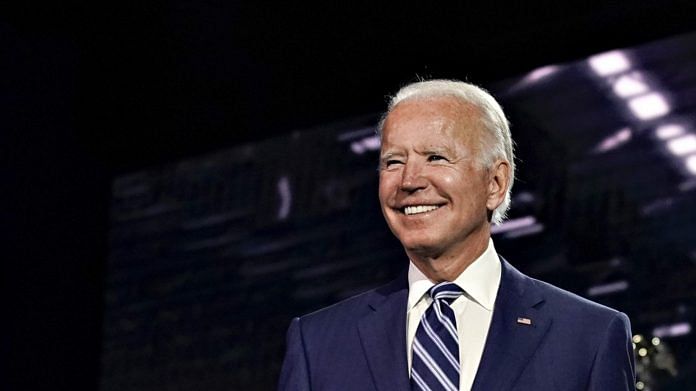New Delhi: After a tumultuous few days of counting in what proved to be a close call between incumbent US President Donald Trump and Democractic candidate Joe Biden, a clear picture has finally emerged — the former vice-president has just about emerged the victor.
In episode 613 of ‘Cut The Clutter‘, ThePrint’s Editor-in-Chief Shekhar Gupta talks about what Biden’s foreign policy might be and what it may mean for India and Prime Minister Narendra Modi.
Quoting extensively from Biden’s longform in the April-March issue of Foreign Affairs where he lays out his vision of what America’s foreign policy might be under his administration, Gupta explains that the President elect’s “why America must lead again” point is very important. “It was said that Obama has moved to an idea of leading from behind,” Gupta says, which was preceded by the backlash the US faced against George Bush’s interventionism around the world.
“Then came Trump whose idea was to leave everything behind,” Gupta says, explaining how America became very insular. According to him, Biden’s view is more internationalist in that he wants to take the US back into global affairs, firstly by rejoining the Paris Agreement.
Gupta picks up a handful of points from Biden’s longform and analyses those. Citing the article, he quotes Biden, “By every measure credibility and influence of the US in the world has diminished since Barack Obama and I demitted office.”
Gupta also notes that Biden had accused Trump of emboldening the US’s adversaries and squandering the country’s leverage to confront national security challenges from North Korea to Iran, Syria to Afghanistan to Venezuela, with practically nothing to show for it.
The second point Gupta focuses on is Biden’s statements on democracy which the latter wrote was “paralysed by hyper partisanship, hobbled by corruption, weighed down by extreme inequality”. According to Biden, the impact of all this has led to democracies struggling to deliver as people’s trust in institutions has diminished.
Gupta also points out that Biden has a plan to hold a summit for global democracies in his first year, adding that he is “shifting American foreign policy from, say, trade and American economy and that kind of internalism to a kind of democratise globalism”.
Biden also promised the reversal of protectionism, citing how the last time this happened — after World War I — it led to World War II. “This is a very strong reversal of the way Trump ran his political economy,” Gupta says.
Also read: Airlines, cannabis, insurance, Hollywood — What’s ahead under Biden, industry by industry
Getting tough with China
Gupta then addresses Biden’s vow to “get tough with China”.
“He (Biden) says you have to put a united front of United States allies and partners to confront China’s abusive behaviour and human rights violations,” Gupta says, explaining how if all countries ally and confront China, that will constitute 50 per cent of the world’s GDP. “China is a country that wants to rise on the strength of its economy and its trade, there is no way China can tread lightly on a block that represents a half of the world’s GDP,” Gupta adds.
Gupta further says that Biden in his piece also talks about the need to repair ties with NATO, using very strong words against Putin — “weakening of NATO that has allowed Vladimir Putin to carry on with this kleptocratic authoritarian regime.” The only time India is mentioned, Gupta says, is when Biden writes, “I will strengthen treaty alliances with Australia, Japan, and South Korea and deepening partnerships, from India to Indonesia, to advance shared values.”
Gupta concludes by noting that don’t look at what a Biden administration does with India, the important thing will be to see how the Biden administration deals with China. “The US-India relationship has now been de-hyphenated from Pakistan, but hyphenated with China,” Gupta says, adding that Biden will not be like Trump in ignoring all that is happening inside India. If the summit of global democracies does take place and Narendra Modi is invited — it will be interesting to see him do so in the background of the CAA-NRC amid the upcoming West Bengal elections, Gupta says.
Watch the latest episode of CTC here:
